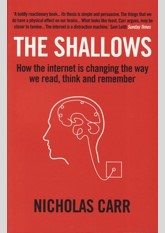The Shallows: How the Internet Is Changing the Way We Think, Read and Remember
Is our constant exposure to electronic stimuli good for us? Can we transform the data we receive into the knowledge we need? Are we swapping deep understanding for shallow distractions? In this book, Nicholas Carr argues that our constant exposure to multiple and faster data streams is changing the way our brains are wired. This change, which is due to the inherent plasticity of the brain, tends to reduce our capacity to absorb and retain what we read. Mr Carr cites a number of different studies to support his views, and the book makes for interesting reading. Mr Carr acknowledges that the digital world brings both advantage and disadvantage: `Every tool imposes limitations even as it opens possibilities.' The Internet is a wonderful tool for finding information, but value usually requires some analysis, and often requires a context which is not always immediately obvious. How do we find a balance between those aspects of life that require self-awareness, time and careful consideration, and those aspects of life where an automatic (or semi automatic) response is more appropriate and perhaps even required? Do we understand what choices we have, or are we responding in line with the immediacy of the medium we are using? Are we consumers of data or evaluators of information? Does it matter? I think it does: `The more distracted we become, the less able we are to experience the subtlest, most distinctly human forms of empathy, compassion, and emotion.' The most valuable aspect of this book, to me, was thinking about the short and long term consequences of the Internet. Those of us who grew to adulthood before the Internet shaped the way we work and communicate have (to varying degrees) embraced the benefits and new possibilities afforded. A return to the past is neither possible nor desirable - but conscious choice is both.

